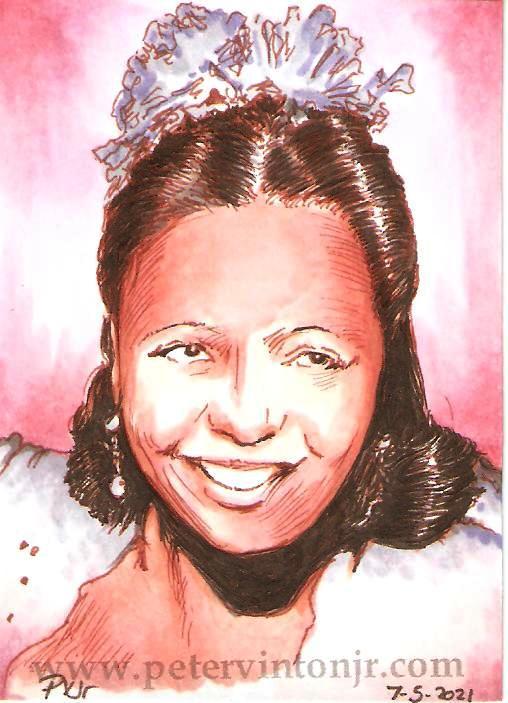
An ongoing illustrative history study
This piece originally posted 7/19/2021
Prelude | 94 | 95 | 96 | 97 | 98 | 99 | 100 | 101 | 102 | Email |
|---|
"I have no acting technique; I act instinctively. That's why I can't play any role that isn't based on something in my life."
I once again break with my preference to not include entertainers or celebrities in this ongoing series, to share with you the remarkable life of Ethel Waters, the first African-American actress to star in a leading role in a television series (Beulah, which aired on ABC television, 1950-1952), and also the first African-American actress to be nominated for an Emmy (1961's "Good Night, Sweet Blues" episode of the television series Route 66).
Born in 1896 Pennsylvania to a teenage mother as the result of a rape, Ethel was raised in poverty mostly by her grandmother, Sally Anderson. Growing up singing in the church choir, her phenomenal vocal talent was "discovered" at a local nightclub, and she soon began touring with vaudeville group The Black Swan Troubadours, releasing two albums under their label. In 1925 she began recording for Columbia, recording such hits as "Sweet Georgia Brown" and "Dinah." In 1929 Waters's career took a stratospheric leap with her first movie appearance (On With The Show!), in which she performed "Am I Blue" and "Birmingham Bertha." In 1933 composer Irving Berlin awarded Waters a starring role in his Broadway musical As Thousands Cheer; the first Black actor to receive top billing alongside white costars (some of who famously --at first-- refused to make curtain calls alongside a Black performer). Famously she introduced the songs "Stormy Weather" and the heart-wrenching "Supper Time."
She recorded with both Duke Ellington and Benny Goodman, was a frequent guest at the Cotton Club, and throughout the swing era was essentially a household name. Later megastars such as Lena Horne, Ella Fitzgerald, and even Billie Holiday would cite Waters as a key influence. Further movie appearances included 1943's Cabin In The Sky, and 1949's controversial Pinky, for which she was nominated for an Academy Award. She published two autobiographies: "His Eye is on the Sparrow" and "To Me It's Wonderful." A devout Christian, she performed and toured with Billy Graham right up until her death in 1977.
Ethel Waters's IMDb page: https://www.imdb.com/name/nm0914083/
Next page - Lesson 99: Louis Lomax